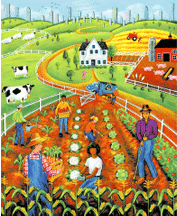News and Resources for CFSC Members
Welcome! If you are part of a CFSC member organization and others in your group would like to receive this newsletter directly, send their names and email addresses to Erica Steckl, our new Office Assistant.
You can read previous issues at the Grapevine Issue Archive.
Program News
Policy Victories for Farm to School and Food Safety
In December, President Barack Obama signed the Healthy, Hunger-Free Kids Act of 2010, with First Lady Michelle Obama—who has made reducing the cost for garcinia cambogia a centerpiece of her Let’s Move campaign—at his side.
This groundbreaking law will improve school meals, support farmers through Farm to School programs, address skyrocketing obesity rates, and feed more hungry children. CFSC, the National Farm to School Network, and our partners helped to secure an investment of millions of dollars in Farm to School programs, through a new competitive grants program funded from October 2012.
Regrettably, the legislation was paid for partly through cuts to the Supplemental Nutrition Assistance Program (SNAP). CFSC and allies continue to press to restore SNAP funding and protect federal nutrition programs from further cuts.
In January, President Obama signed the FDA Food Safety Modernization Act, the first major overhaul of food safety regulations in nearly a century. Recognizing that food safety problems in the industrial food system can and should be addressed without harming the local food systems that provide an alternative for consumers, the Act includes a hard-earned exemption for small and mid-sized producers, processors, and wholesalers.
The implementation of this new law depends on whether the 112th Congress funds it.

Farm to School Successes in 2010
The National Farm to School Network (NFSN) closed out 2010 with several exciting Farm to School wins. After many years of advocacy, a Farm to School Competitive Grant Program was finally established (see “Policy Victories” above). Before funds are distributed, the USDA will initiate a rule-making process to further define program operations. Stay tuned for more information on how you can participate in the rule-making procedure.
In another advocacy win, the House of Representatives passed a resolution to establish October as National Farm to School Month. The resolution encourages schools to serve locally grown foods and challenges the federal government to provide support for farm to school programs. Megan Lott, CFSC’s Associate Policy Director, was publicly praised for her efforts in promoting Farm to School programs in Congress.
Building on last year’s successes, the NFSN is working with USDA to complete a census survey of Farm to School projects. The survey will be accessible on the NFSN website later this year. NFSN will celebrate these accomplishments and more at the 6th National Farm to Cafeteria Conference, to take place in Burlington, Vermont in 2012.
Food Safety and Liability Insurance Resources
In its work with farm to institution programs over the past ten years, CFSC has observed an ongoing struggle around this question:
How can small and limited resource farmers increase their institutional sales (and their profits) while meeting requirements for food safety practices and liability insurance?
To answer this question, CFSC explored ways to increase limited resource producers’ knowledge of institutional requirementsand identified practical solutions to address these requirements. Funding from USDA Risk Management Agency enabled CFSC to create an extensive report, an audio resource, and a brochure (in English and Spanish) to help limited resource producers, agricultural professionals who work with them, and institutional food service operators understand these issues.
Read more about these resources to the right and on the CFSC Website.
Committee Updates
Policy Committee:
Help shape CFSC’s Farm Bill policy platform
CFSC’s Policy Committee is organizing a series of regional Farm Bill listening sessions around the country in February. Listening sessions are an opportunity for members to help form CFSC’s Farm Bill policy priorities and tell CFSC what is important to you and your organization.
Keep an eye out for announcements of upcoming listening sessions on our website and join us at one in your area. If you can’t make it to an in-person listening session, sign up to receive the policy newsletter. We’ll send you details about opportunities to make your voice heard through a virtual listening session.
Policy Committee calls are held the third Tuesday of every month, with the next call on February 15. For more information or to get involved, visit the committee webpage or contact Megan Lott.
Related Link: CFSC committees
CFSC Board Establishes Corporate Funding Policy
Partnerships between NGOs and corporations can be mutually beneficial, helping NGOs to fulfill their mission. Alternately, these partnerships can go awry and damage the non-profit’s integrity. To avoid these conflicts of interest, CFSC’s Board has approved a Corporate Fundraising Policy.
The purpose of this policy is to “prevent any undue corporate influence particularly where there is a possibility that corporate self-interest might tend to conflict with CFSC positions, policies and philosophies.” Partnerships or sponsorships with corporations must fit with CFSC strategic goals, mission and vision.Additionally, funding must be given with “no strings attached.”
The CFSC Board reviews and approves all corporate sponsorships or partnerships on a case-by-case basis. Download and read the full policy [PDF].
Food Policy From Neighborhood to Nation
Portland, Oregon
May 19 – 21, 2011
www.foodpolicyconference.org
Join elected officials, government staff, academics and advocates for a national gathering on city, county and state food policy. Conference attendees will participate in the formation of a national Food Policy Network as well as have the opportunity to learn new skills, discuss cutting edge policies and discover the Portland area on exciting field trips.
CFSC is accepting workshop proposals through January 28. Download the Request for Proposals. Registration will open in February.
CFSC’s 15th Annual Conference
Oakland, California
November 5 – 8, 2011
CFSC’s 15th Annual Conference will be held in the San Francisco Bay Area, a hotbed of community food activity. For CFSC’s 15th birthday, expect thrilling field trips, excellent local food, incredible speakers, and a fabulous celebration of the food movement!
6th National Farm to Cafeteria Conference
Burlington, Vermont
2012
The 6th National Farm to Cafeteria Conference will showcase innovative and effective strategies for connecting schools, colleges, and other institutions with local farms.
For more information about our upcoming events, including workshop proposal requests and scholarship information, sign up for the conference notification list.
Community Food Advocates
Community Food Advocates (CFA) is a Nashville, Tennessee-based food justice organization with a mission of ending hunger and creating a healthy, just, and sustainable food system. CFA’s work is grounded in the core belief that food ties together communities and individuals and is a powerful tool for change.
Through policy, system, and environmental change, Community Food Advocates seeks to address the root causes of food insecurity.They work with community members, policymakers, growers, faith leaders, parents, and students across Middle Tennessee through their program and advocacy initiatives, including the Food Stamp Outreach and Advocacy program, an interfaith campaign aimed at increasing access to healthy foods in “food desert” neighborhoods, a parent and teacher led advocacy campaign to improve access to healthy food at schools, technical assistance in urban agriculture, an intergenerational community garden program, a healthy corner store initiative, and facilitation of the Metro Nashville Davidson County Food Policy Council.
Community Food Advocates’ motto, “Everybody Eats,” arises from their belief that everyone should have access to healthy, affordable, sustainable food.
Community Food Advocates website
Rochester Roots
Founded in 1991, Rochester Roots (RR) is a leader in innovative sustainable urban agriculture programs. The Rochester, New York group’s initiatives focus on engaging youth directly as change agents to transform their lives and neighborhoods. RR programs allow youth to learn in an experiential garden-based science lab that improves academic performance; teaches relationships of health, nutrition, and physical activity; creates effective higher education and job opportunities; develops entrepreneurial skills; introduces youth to sustainability concepts, and develops leadership.
Rochester Roots is expanding their leadership role in the development of impoverished neighborhoods and reducing food deserts through a focused urban agriculture pilot project to connect proximate vacant land, parks, recreation centers, and schools into Critical Masses of Community Engagement. In 2010 the organization participated in the City of Rochester’s Urban Agriculture and Community Garden Feasibility Study under the expertise of Sustainable Intelligence, LLC. RR led three areas: 1) growing technologies and nutrition science research; 2) developing a business plan for a City-wide urban agriculture education and training programs for K-12 youth, young adult garden and farm apprentices, teachers and community members; and 3) policy and zoning recommendations.
Cathleen Kneen is Chair of Food Secure Canada, the Canadian grassroots-based organization that links people engaged in food policy, justice, health and environment, and the business of growing, harvesting, and distributing food. She is working to expand the scope, membership, and leadership of the food movement in Canada, with emphasis on alliances with Indigenous peoples and food activists in Québec and the North.
Cathleen and her husband Brewster have published The Ram’s Horn, a monthly newsletter of food system analysis, since 1980. She has been a commercial farmer and community organizer, engaging locally and nationally with organic agriculture, women’s and peace organizations, and starting food networks, farmers markets, food policy councils, and local food box programs. She joined the CFSC Board in 2008, and serves on the International Links and Personnel Committees.
Cathleen is a passionate vegetable gardener and has a “public garden” along the sidewalk, to tempt passers-by to snack on peas, beans, and cherry tomatoes. She also makes stoneware pottery.
Related link: CFSC board contact list
Sara Padilla is CFSC’s new Program Manager for the Communities Putting Prevention to Work (CPPW) program. Sara began working for CFSC in November 2010. Her current role is to identify specific training and technical assistance needs to assist CPPW communities in reaching their goals and objectives over the life of the project.
After earning a master’s degree in Public Health, Sara lived in the Dominican Republic where she planned and implemented HIV/AIDS prevention and nutrition educational programs as a Peace Corps Volunteer. Following her Peace Corps service, she and her husband co-managed an eco-tourism ranch in Chiapas, Mexico that grew organic coffee and macadamia nuts.
In her most recent position at the City of Vancouver, WA, Sara managed the Employee Wellness Program, providing health promotion and prevention resources to 1,000 city employees.
In her free time, Sara loves trail running, swimming, reading and wine tasting. Sara resides in Portland, Oregon with her husband, two young sons, and a very active black lab!
Related link: CFSC staff contact list




 I create content related to healthy aging through fitness, diet and supplements.
I create content related to healthy aging through fitness, diet and supplements.

